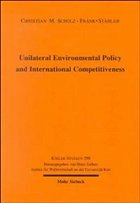One of the most discussed topics in the public debate is whether international competitiveness may be increased by stricter environmental policy in only one country. On the one hand, environmental policy is assumed to raise international competitiveness and thus welfare by inducing factor substitution and innovations, which raise productivity and contribute to a long-run cost decrease. On the other hand, environmental policy is supposed to lead to cost increases and to induce capital flight into jurisdictions with softer environmental standards, and ultimately to a decrease in international competitiveness and welfare. The authors contribute to a better understanding of the cases for which a positive influence of environmental policies on competitiveness can be expected. It is shown that a positive influence is theoretically possible under restrictive assumptions. However, it is also demonstrated that there is no empirical evidence which supports such assumptions.
Einseitige Umweltpolitik und internationale Wettbewerbsfähigkeit. Von Christian M. Scholz und Frank Stähler.
Eine der meistdiskutierten wirtschaftspolitischen Fragen ist, ob eine striktere Umweltpolitik in einem Land die internationale Wettbewerbsfähigkeit erhöhen kann. Zum einen wird behauptet, daß Umweltpolitik die internationale Wettbewerbsfähigkeit und damit auch die Wohlfahrt durch induzierte Faktorsubstitution und produktivitätssteigernde Innovationen erhöht. Zum anderen wird angeführt, daß Umweltpolitik eine Kapitalflucht in Länder mit laxerer Umweltpolitik bedingt, so daß sich internationale Wettbewerbsfähigkeit und Wohlfahrt verringern. Die Autoren tragen zu einem besseren Verständnis beider Positionen bei und arbeiten die zu erfüllenden Voraussetzungen heraus. Es wird gezeigt, daß ein positiver Einfluß zwar theoretisch unter restriktiven Annahmen möglich ist; allerdings gibt es hierfür keinerlei empirische Evidenz.
Can a stricter environmental policy increase international competitiveness? Christian M. Scholz and Frank Stähler examine the effects of a one-sided environmental policy on the various indicators of international competitiveness.
Einseitige Umweltpolitik und internationale Wettbewerbsfähigkeit. Von Christian M. Scholz und Frank Stähler.
Eine der meistdiskutierten wirtschaftspolitischen Fragen ist, ob eine striktere Umweltpolitik in einem Land die internationale Wettbewerbsfähigkeit erhöhen kann. Zum einen wird behauptet, daß Umweltpolitik die internationale Wettbewerbsfähigkeit und damit auch die Wohlfahrt durch induzierte Faktorsubstitution und produktivitätssteigernde Innovationen erhöht. Zum anderen wird angeführt, daß Umweltpolitik eine Kapitalflucht in Länder mit laxerer Umweltpolitik bedingt, so daß sich internationale Wettbewerbsfähigkeit und Wohlfahrt verringern. Die Autoren tragen zu einem besseren Verständnis beider Positionen bei und arbeiten die zu erfüllenden Voraussetzungen heraus. Es wird gezeigt, daß ein positiver Einfluß zwar theoretisch unter restriktiven Annahmen möglich ist; allerdings gibt es hierfür keinerlei empirische Evidenz.
Can a stricter environmental policy increase international competitiveness? Christian M. Scholz and Frank Stähler examine the effects of a one-sided environmental policy on the various indicators of international competitiveness.

